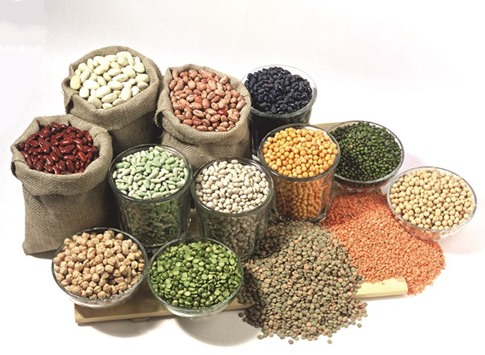What’s trending in nutrition for the new year? Here’s a big one: The UN has declared 2016 the International Year of Pulses. Not the kind of pulse you take to find your heart rate. Pulses are crops of legumes such as lentils, beans, peas and peanuts that are harvested and dried for food. These foods are a critical part of our world’s food basket, says the UN’s Food and Agricultural Organisation (FAO).
Why? Besides being nutrition powerhouses, pulse crops are good for the environment. They have the ability to “fix” nitrogen _ they change nitrogen in the atmosphere into a useful form from which protein is made. Ounce for ounce, they provide twice the protein of wheat and three times the protein of rice.
Pulse crops are also shelf stable – they can be stored for long periods of time without spoiling or losing their nutritional value.
Here are other good reasons to eat more of these foods in 2016, according to the US Dry Bean Council:
They’re good for your heart. Unlike many animal-based proteins, beans are naturally low in fat and are free of harmful saturated and trans fats. And they contain no cholesterol.
They may reduce your risk for certain cancers. Antioxidant nutrients and naturally occurring plant “phyto” chemicals in beans have been shown to be effective fighters against the growth of certain types of cancer, including colon, stomach and endometrial cancer.
They help keep blood sugars in balance. Legumes and beans are considered low glycemic index foods; the carbohydrates they contain are digested slowly. That makes them a good choice for people with diabetes. (Note: Beans are also high in potassium, which may need to be limited in people with diabetes-related kidney disease.)
They can help you keep your girlish (or manly) figure. Legumes, beans and peas are an excellent source of dietary fibre. Research shows that people who eat more fibre tend to weigh less.
They may improve vitality and longevity. Legumes, beans and peas are rich in protein and complex carbohydrates that maintain muscle strength and endurance. And they are rich in vitamins and minerals that work together to produce and sustain energy.
They can help build healthy babies. Pulses are rich in folate – a B vitamin critical for fetal brain and spinal cord development. Adequate intake of folate during pregnancy can prevent certain types of birth defects known as neural tube defects.
They can provide important nutrients for people with food allergies or intolerances. For example, beans and lentils do not contain gluten, a protein found in wheat, barley and rye. Pulse foods can therefore be enjoyed by people with celiac disease or other gluten intolerances.
Lastly, these foods are good for the body and easy on the pocketbook; literally the best nutritional buy in the whole supermarket. Have a happy and health-filled new year!

Prashanth
